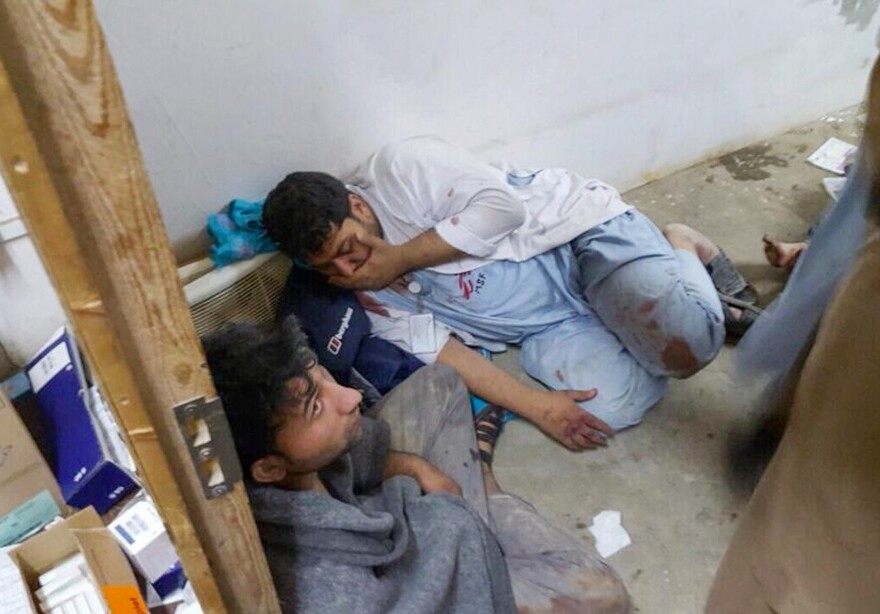About 2 a.m. on Oct. 3, Afghanistan time, medical staff and patients at the Medecins Sans Frontieres hospital in Kunduz heard the sounds of bombing, louder and closer than they'd heard before. By the time it was over, at least 12 medical workers and seven patients were dead and the hospital was in flames.
"Nine patients are still unaccounted for, and we have not been able to reach 24 of our 461 staff members," says Jason Cone, executive director of MSF, also known as Doctors Without Borders. "It's possible that some of them are dead." Unable to continue its work, MSF withdrew from the hospital in Kunduz as the fighting continued.
President Obama personally apologized Wednesday to Dr. Joanne Liu, president of MSF, for the bombing in which U.S. planes attacked the hospital. The incident represents the largest loss of life for the organization from an airstrike, and MSF is demanding an investigation by the International Humanitarian Fact-Finding Commission, established by the Geneva Conventions to investigate violations of international humanitarian law. The commission has not been called upon to act since its establishment in 1991 and requires a request from at least one of the 76 nations that have signed on to it to begin its work.
We spoke to Jason Cone about the aftermath of the bombing and its effect on his and other humanitarian organizations.
Your organization has worked for many years in very dangerous places. Accidents and tragedies have happened before. How does this compare with MSF's previous experience with danger and death?
In terms of one, single violent event, this is the biggest loss we've had. Beyond that, this is the most exceptional event in that it was the direct targeting of a medical facility with a large loss of life. [Editor's note: The U.S. calls the bombing a mistake.] It was a well-known facility and we fully communicated that it was a functional hospital full of patients and staff. It really shook us up in terms of a lack of respect for humanitarian law.
President Obama personally apologized in a phone call to Dr. Liu. What is MSF's response to that apology?
We received that apology. However, we really feel the best way for the U.S. government to respond is to accept a commitment to an independent investigation led by the International Humanitarian Fact-Finding Commission. We focused on this, rather than a criminal or human rights investigation, because we need to substantiate with as much fact as possible why and how this happened.
How does this bombing affect humanitarian work around the world?
If we can't expect protection of such a widely known, active medical structure from the parties of conflict, then it undermines the safety and security of our teams everywhere — and not just our teams. It undermines safety and security for all humanitarian organizations. It erodes respect.
What steps should be taken to ensure that hospitals are respected as fighting-free zones?
Actually, we don't need anything new. There are laws of war, the Geneva Conventions. Countries coming forward to support an independent, fact-finding commission is the most fundamental action that can take place to ensure renewed respect for the laws of war.
This is a salient moment in clarifying where countries stand on an objective investigation into what happened. It's a golden opportunity for the U.S. to show its commitment to rules of war, an opportunity to demonstrate full transparency and openness and to be judged based on respect for these laws.
MSF found it necessary to pull out of Kunduz. What are the consequences for the people in that area?
With us out of there and our hospital inoperable, several hundred thousand people have lost their only access to surgical trauma care. We had treated 394 war wounded since the start of fighting earlier (in the week of Sept. 27). We treated between 20,000 to 25,000 people at that hospital in the past four years. Now, the nearest medical facility might be a couple of hours away.
This fall, MSF received the Lasker Award for its contribution to the fight against Ebola. Now, the organization is tragically back in the news. How is morale inside MSF?
It's been a tough year. We've been told in different ways that our work is important. We expect to deal with emergencies and unforeseen events: the Ebola emergency, Gaza, the beginning of war in South Sudan, a huge outbreak of fighting in Central African Republic. But to have our hospital bombed has been devastating.
Can you tell me anything about the MSF workers who were killed?
Yeah. (Long pause.) We haven't released their names and bios yet, but what I can tell you is that they, like all our teams, are incredibly dedicated to their patients and each other. They are some of the bravest and most committed people I know. They treat anyone. They're there to heal. After the bombing they did everything they could. They kept treating people even after the hospital was on fire. These are not people who run away from the fire. They run into it.
Copyright 2021 NPR. To see more, visit https://www.npr.org.



